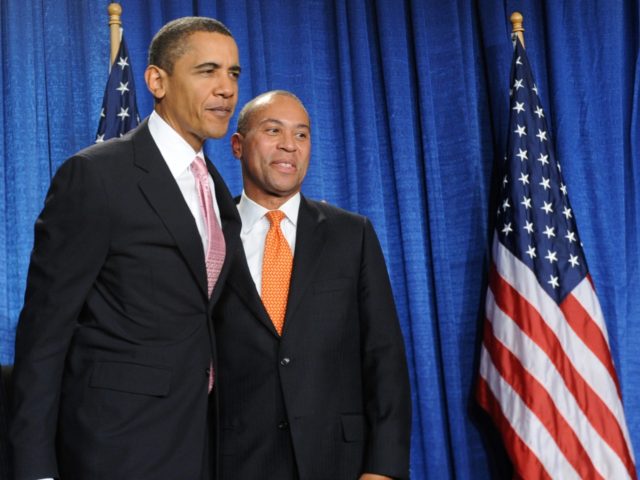Former Massachusetts Gov. Deval Patrick may have hopes of achieving the Democrat presidential nomination in 2020, but his decision to promote replacement of his state’s high education standards with Common Core in 2010 ultimately led to its fall as a model for the nation.
The Atlantic chronicled Patrick’s close relationship with former President Barack Obama Thursday, asserting Patrick is Obama’s “rightful heir,” “an actual longtime friend based on mutual affinities.”
That friendship was the basis for the decision by Patrick a decade ago to work to replace the high academic standards that gave Massachusetts its top ranking among states in the country with the Obama-incentivized Common Core State Standards.
Common Core was sold as a social justice reform that – above all else – would close the achievement gap between largely white, middle-income students and the mostly black and Hispanic students from lower-income families.
That effort has failed abysmally, as Peggy Carr, associate commissioner of the National Center for Education Statistics, lamented in October after the results of the Nation’s Report Card assessments showed U.S. public school children have made “no progress” in reading or mathematics over the ten years.
“Over the past decade, there has been no progress in either mathematics or reading performance, and the lowest-performing students are doing worse,” Carr said, according to Education Week. “In fact, over the long term in reading, the lowest-performing students—those readers who struggle the most—have made no progress from the first NAEP administration almost 30 years ago.”
Jamie Gass, director of the Center for School Reform at the Boston-based Pioneer Institute, and Charles Chieppo, a senior fellow at Pioneer, wrote specifically about Common Core’s effect on Massachusetts at the American Conservative in May. While the Bay State had been one of three states to make progress in closing the achievement gap between 1998 and 2009, the trajectory changed when Patrick pushed the legislature to adopt Common Core.
Gass and Chieppo summarized:
When the Obama administration kicked off its push to federalize public education by making adoption of Common Core English and math standards a condition of receiving federal grant money, Massachusetts acquiesced. It adopted the standards in 2010.
Common Core cut the amount of classic literature, drama, and poetry that Massachusetts students study by 60 percent. The math standards, which Stanford University mathematics professor emeritus R. James Milgram called “shopping cart math,” no longer get students to algebra by eighth grade.
Subsequent revisions also dumbed down the Bay State’s science and U.S. history standards. In 2009, then-governor Deval Patrick’s administration brushed aside the state law that required history to join English, math, and science as a high-stakes test. Instead he pushed new age fads, including educating the “whole child” and vacuous “21st-century skills.”
The results of Massachusetts’ decision to adopt the education “reform” known as Common Core came fast.
Though the state remains among the top performing in the nation, state scores have “either stagnated or declined in both English and math,” wrote the Pioneer authors.
“In the Common Core era, the Bay State was among those that saw the biggest declines in math,” they observed.
As might have been predicted, however, in January 2015, Obama-era Education Secretary Arne Duncan gave a glowing tribute to Patrick in an op-ed at the Boston Globe, praising the outgoing governor, claiming the state of Massachusetts had led the nation in education under the direction of the Common Core champion Patrick.
“In many ways, Massachusetts is now helping to lead the country where it needs to go in education,” Duncan said.
However, Pioneer’s executive director Jim Stergios countered in an op-ed, also at the Globe.
“Who says Common Core advocates don’t like fiction?” Stergios challenged. “US Education Secretary Arne Duncan got one fact right: Massachusetts leads the nation in education. Attributing that progress to Governor Patrick’s leadership is like suggesting that a pinch runner who finds himself on third base hit a triple.”
Stergios noted Massachusetts had held the highest spot in all subjects on national assessments for a decade, and that prior to Patrick’s inauguration in 2007, the state had already been identified as “one of the fastest improving states in the nation.” In addition, just several months into that year, Massachusetts students had been ranked on international math and science assessments with the top six countries.
“Only a politician, or an education secretary playing one, would attribute Massachusetts’ success to Patrick,” Stergios asserted. “The best one can say about overall student achievement in the Commonwealth during Patrick’s terms in office is that it has been stagnant. An objective observer would note significant areas of decline.”
The Pioneer executive director noted that, since the Common Core’s adoption in Massachusetts, “sampled national tests show fourth-grade reading scores, the best predictor of future success, falling more significantly in Massachusetts than anywhere else in the country.”
The state’s SAT scores had dropped 20 points during Patrick’s tenure as well though, prior to becoming governor, the SAT scores had “risen for 13 consecutive years.”
Yet another reason to question Duncan’s praise for Patrick—and the Common Core standards—was Stergios’ observation that, prior to 2007, “67 percent of third graders scored advanced or proficient on the state’s third-grade reading tests… that number is now 57 percent.”
Stergios wrote Patrick’s decision to join the Obama administration in its push for Common Core led to the governor’s desertion of “two pillars of Massachusetts’ original, bold reforms — academic content standards that approached those in the highest-performing nations and a unique accountability system focused on improving district leadership and performance.”

COMMENTS
Please let us know if you're having issues with commenting.